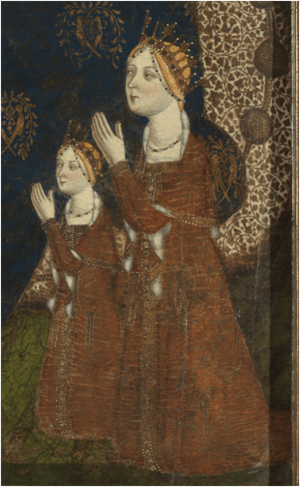Juana Manuel facts for kids
Quick facts for kids Juana Manuel |
|
|---|---|

Juana and one of her daughters, painted by Jaime Serra in the mid-fourteenth century
|
|
| Queen consort of Castile and León | |
| Tenure | 1369–1379 |
| Born | 1339 |
| Died | 27 March 1381 (aged 41–42) Salamanca |
| Burial | Cathedral of Toledo |
| Spouse | Henry II of Castile |
| Issue | John I of Castile Eleanor, Queen of Navarre Infanta Joanna |
| House | Castilian House of Ivrea |
| Father | Juan Manuel, Prince of Villena |
| Mother | Blanca Núñez de Lara |
| Religion | Roman Catholicism |
Juana Manuel (born 1339 – died 27 March 1381) was a very important noblewoman in the Kingdom of Castile. She became the Queen of Castile from 1369 to 1379. This happened because she married Henry II of Castile, who became king.
Juana was also a wealthy heiress. She owned many lands and titles, including Escalona, Villena, Peñafiel, and Lara. She was also the Lady of Biscay, a significant area.
Contents
Her Family Background
Juana Manuel was the daughter of Juan Manuel, Prince of Villena (1282–1348). Her mother was Blanca Núñez de Lara de La Cerda. Blanca passed away in 1347.
Juana's mother, Blanca, came from a powerful family. Her ancestors included the lords of Biscay and Lara. She was also related to Fernando de la Cerda, who was the eldest son of King Alfonso X. Juana was the last official member of the House of Ivrea in her family line.
Her Marriage to King Henry
Juana's father, Juan Manuel, had been an enemy of King Alfonso XI of Castile. The king wanted to make sure Juan Manuel's family didn't cause any more trouble. He also wanted to gain control of their lands and power.
Even though Juana was young, she had to follow the king's wishes. King Alfonso XI had a powerful mistress, Leonor de Guzmán. Leonor wanted her eldest son to gain important lands and a high position.
So, on 27 July 1350, Juana's brother, Fernando Manuel of Peñafiel, arranged her marriage. She married Henry (1333–1379), who was one of King Alfonso XI's sons born outside of marriage. This marriage gave Henry control over some valuable lands.
Later, several of Juana's relatives passed away. This made Juana an even greater heiress, inheriting much more land and wealth. Her husband, Henry, then became a serious challenge to the king's power.
Becoming Queen of Castile
In 1361, Juana inherited the lands of Villena, Escalona, and Peñafiel. This happened after her teenage niece, Blanca, passed away. Blanca was the daughter of Juana's brother, Fernando Manuel, who had died earlier around 1350.
Juana also inherited Lara and Biscay. She received these lands because she was the granddaughter of La Palomilla (Juana Núñez de Lara). Other cousins, Isabel de Lara and her young daughter Florentina, also passed away, leading to Juana inheriting these territories.
In 1369, Juana's husband, Henry, became King Henry II of Castile. He took the throne after a conflict with his half-brother. With Henry as king, Juana became the Queen of Castile and León.
Juana Manuel passed away on 27 March 1381. She left all her inherited lands and titles to her son. This included Biscay, which then officially became part of Castile. Eventually, these lands became part of what we know today as Spain.
Her Children
Juana Manuel and King Henry II had several children:
- King John I of Castile (1358–1390)
- Eleanor (died 1416), who became Queen of Navarre.
- Joanna
See also
 In Spanish: Juana Manuel de Villena para niños
In Spanish: Juana Manuel de Villena para niños
 | Madam C. J. Walker |
 | Janet Emerson Bashen |
 | Annie Turnbo Malone |
 | Maggie L. Walker |

